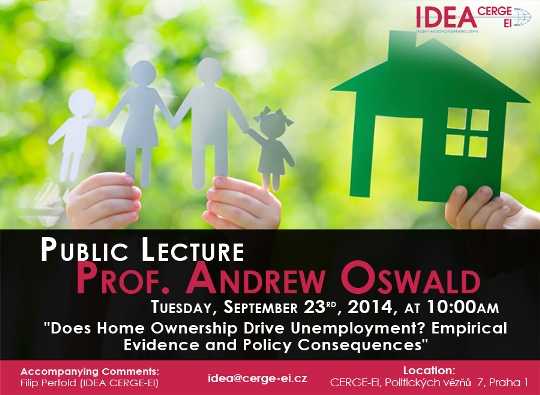View by Day
10:00 | Public Lecture
Prof. Oswald will present a study in which he shows that U.S. regions with the greatest growth of private home ownership registered the greatest increase in unemployment. Filip Pertold, researcher at CERGE-EI's think tank IDEA, will contribute with a discussion of whether such a scenario could arise in the Czech Republic.
Venue: CERGE-EI, Politickych veznu 7, 111 21 Prague 1
Date: September 23rd, 2014
Time: 10:00 - 11:30 a.m.
The event will be held in English with simultaneous interpretation to Czech. The event will be followed by a reception.
Capacity is limited so please reserve your seat by Friday, September 19th, 2014.
16:30 | Micro Theory Research Seminar
Prof. Botond Kőszegi “Unrealistic Expectations and Misguided Learning”
Central European University, Budapest, Hungary
Authors: Paul Heidhues, Botond Kőszegi, and Philipp Strack
Abstract: We explore the learning process and behavior of an individual with unrealistically high expectations about ability when outcomes also depend on an external state of the world that affects the optimal action. We identify a broad class of situations in which “learning" leads the individual systematically away from a correct understanding of the world and to lower and lower performance. Even if the agent has correct initial beliefs about the state, due to her unrealistic expectations she is negatively surprised about her outcome. As a result, she becomes more pessimistic about the state of the world, and adjusts her behavior---suboptimally. This adjustment lowers outcomes, perpetuating the misdirected learning further. The greater is the loss from choosing a suboptimal action, the further the agent's action ends up from optimal. If the agent has an outside option, then she is initially too willing to enter a task in which performance depends on her ability and may persist in it for too long (as described in the existing literature), but she eventually tends to quit even superior tasks and to switch too much between tasks. We argue that our model provides one mechanism for self-defeating behavior described in the psychology literature, and that the decision situations in question are common in economic settings, including bureaucratic decisionmaking, delegation, public policy, and labor-leisure choices.









